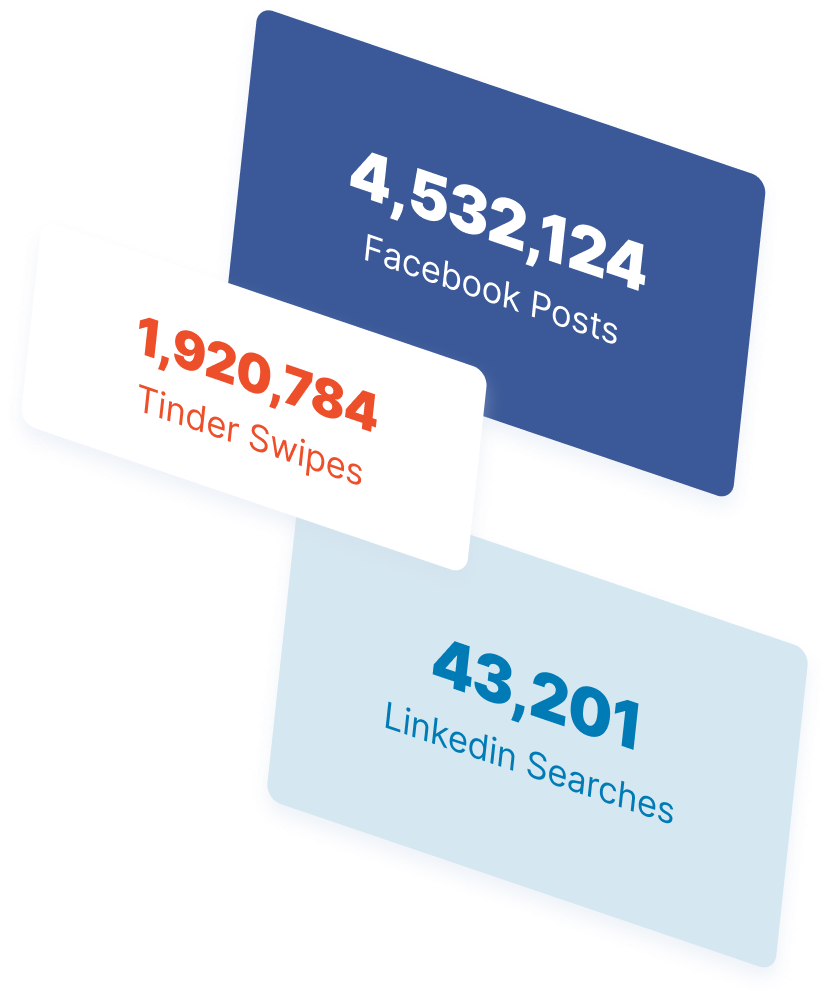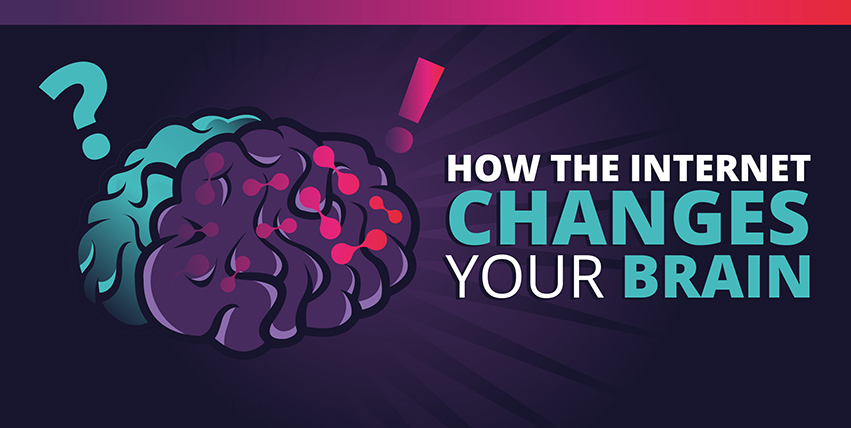-
 7 min. read
7 min. read
-
 Trevin Shirey
Trevin Shirey VP of Marketing
VP of Marketing
- Trevin serves as the VP of Marketing at WebFX. He has worked on over 450 marketing campaigns and has been building websites for over 25 years. His work has been featured by Search Engine Land, USA Today, Fast Company and Inc.
The Internet is a huge part of everyday life. What started as a project to share data among West Coast universities has exponentially grown and taken a life of its own. Still, the Internet is relatively new to the world.
Computer scientists laid the foundation for the Internet in 1969, and in the past 45 years it’s become the fastest and most efficient avenue of information exchange in history. With text, photo, video, games, social networks, and more, it’s no wonder Millennials reportedly average three-and-a-half hours on the Internet every day — and they’re not even the generation that’s fully grown up with Internet access. But does all of this time spent online have consequences?
That’s what I wanted to check out. I love the Internet — it’s a big reason why I work at WebFX — and when I first started researching this topic, I didn’t think I’d find anything conclusive on how the Internet affects people’s brains. I was really just curious.
But with help from researchers and psychology publications, I found some compelling evidence that stopped me in my tracks. And while I stubbornly didn’t want to believe it all at first, I can’t refute the research — the Internet really does change your brain. Embed This Graphic On Your Site

Embed How the Internet Changes Your Brain Infographic
The Internet is supernormal
When I started forming this idea, I wanted to speak directly to someone who knew the subject.
Enter Dr. Adrian F. Ward, an assistant professor at UT Austin who earned his Ph.D.
in psychology from Harvard and researches how technology shapes our lives. With his consultation, I dove into a goldmine of data, trends, and information that blew my mind. It’s in one of Dr.
Ward’s papers that I first saw the Internet described as “supernormal,” which is the best single-word description of the Internet I’ve heard. Supernormal stimuli are basically man-made creations that spark activity in our brains more than anything natural. Plus, even when you break the word into its separate parts, it still makes sense — the Internet is a superpower for information retrieval, and it’s normal because we use it every day of our lives.
After reading Dr. Ward’s paper, I jumped down the rabbit hole of psychological research, journal publications, and government statistics to find as much information as I could that showed the Internet conclusively has an effect on our brains. From the relationship between extreme screen time and short attention spans to online power gamers, it became clear that the “supernormal” Internet could impact people’s brains in a limitless number of ways.
And, in some cases, that impact was extreme.
Internet addiction
The controversial diagnosis of Internet addiction is gaining steam around the world, especially in China, Japan, and South Korea. Some American rehab centers are already introducing programs to help those with an addiction to data, but the lion’s share of US psychiatrists (and the DSM-V) isn’t ready to classify extreme Internet use as an “addiction.” Still, several countries, mostly in Asia, have already accepted the condition as a problem, and they’re treating it.
China is at the forefront of Internet addiction treatments, which are documented in the recent PBS documentary Web Junkie. The documentary follows three Internet addicts in a treatment center that acts as a “boot camp” to kick their habit, and it also highlights the impact of the addicts’ behavior on their families. Internet addiction may not be a universally accepted diagnosis right now, but the documentary makes it clear — addiction is very real.
Beyond that, new reports on the consequences of too much screen time for children — not to mention the ensuing tsunami of related opinion pieces — pop up by the day. It’s like the scientific community finally has enough resources and reasons to delve into how the digitization of everyday life affects us (and has been affecting us), and they’re not letting anything get in their way. With that in mind, it makes sense that we’re just now determining the potential of Internet addiction, especially since the past few generations are the first to live in a world that is fully connected on a digital level.
By the time I finished researching everything, I had one last question burning in my brain.
Is it all bad?
I realize that some information in this infographic may paint Internet use in a negative light, but that’s not necessarily the best way to view it. The biggest reason this information may appear negative is that we’re comparing a world of heavy Internet use to the standards that we established in a pre-Internet world.
But the Internet is a game-changer — a huge one — and its constant presence in our lives could redefine the standard by which we evaluate what is and isn’t healthy. After all, Socrates famously hated writing. He predicted that it’d forced people to stop using their memories and warned that it’d straight-up murder the ancient tradition of oral storytelling.
The only written accounts of Socrates that we have are exclusively written by other people, like Plato, because Socrates hated writing that much. While Socrates may have been the greatest mind in ancient thinking, humanity as a whole has definitely benefited from writing, even if it broke Socrates’ ideas of convention at the time. Similarly, it’s possible that the best thinkers of today are warning us about the Internet because of the changes it can bring, but that doesn’t necessarily mean that its future potential is exclusively negative.
If history has shown us anything, embracing the Internet — like writing — will revolutionize how we live on a colossal scale. Sure, allowing the Internet to impact how you treat your job and family is bad — nobody is going to argue that. But the fact that so much of our lives is moving online doesn’t necessarily spell doom for humanity.
It just means newer generations are more “wired in” than the generations preceding them, and who can say if such a radical change is actually “healthy?” I don’t think anyone can say what our collective Internet use means for the future, but regardless of our opinions, I think it’s safe to assume the Internet isn’t going anywhere any time soon. At least, that’s my hope. I wouldn’t want to see the Internet go anywhere — like I said, it’s an informational superpower.
And it might be so powerful that it changes how our very brains operate. So it’s not all bad — it’s mostly an issue of change versus the status quo. In fact, I’m excited to see what the future brings with more connectivity and interaction taking place online.
I have no idea what the world will be like in 10 years, but I know the Internet will play an even bigger role than it does now. That’s what makes the supernormal Internet so exciting.
What do you think?
The Internet is a major part of all of our lives, even if you only use it for work or email.
So what do you think? What do you see in the future for the Internet? Do you spend a lot of time online?
And do you think that time is spent well or wasted? I want to hear your thoughts in the comments!
-
 Trevin serves as the VP of Marketing at WebFX. He has worked on over 450 marketing campaigns and has been building websites for over 25 years. His work has been featured by Search Engine Land, USA Today, Fast Company and Inc.
Trevin serves as the VP of Marketing at WebFX. He has worked on over 450 marketing campaigns and has been building websites for over 25 years. His work has been featured by Search Engine Land, USA Today, Fast Company and Inc. -

WebFX is a full-service marketing agency with 1,100+ client reviews and a 4.9-star rating on Clutch! Find out how our expert team and revenue-accelerating tech can drive results for you! Learn more
The Internet in Real Time
Ever wonder how much is going on at once on the Internet? It can be tough to wrap your mind around it, but we’ve put together a nice visual that’ll help! The numbers show no sign of slowing down either.
Find out More

Ready to Drive Results for Your Business?
See how WebFX uses SEO, PPC, Social Media, and Web Design to Drive Revenue for Businesses.
Get InspiredThe Internet in Real Time
Ever wonder how much is going on at once on the Internet? It can be tough to wrap your mind around it, but we’ve put together a nice visual that’ll help! The numbers show no sign of slowing down either.
Find out More





